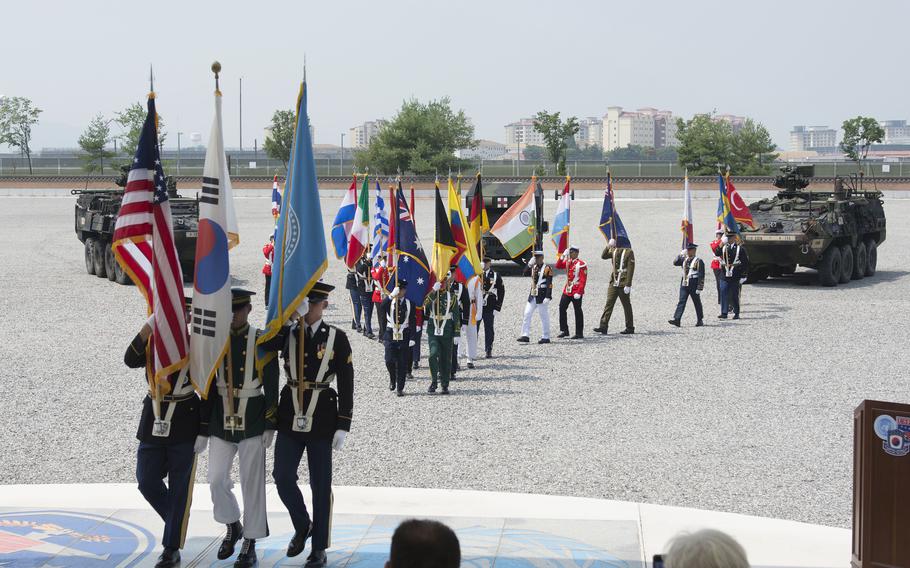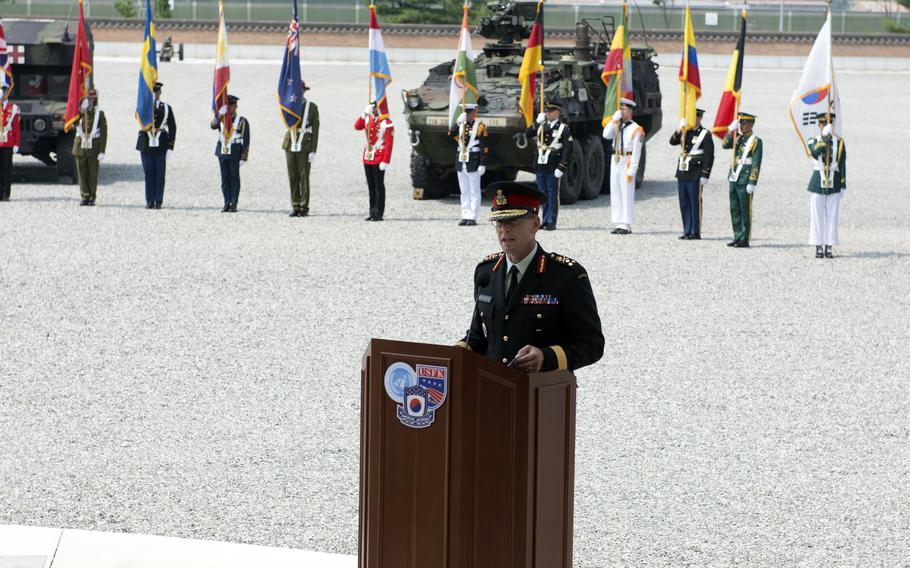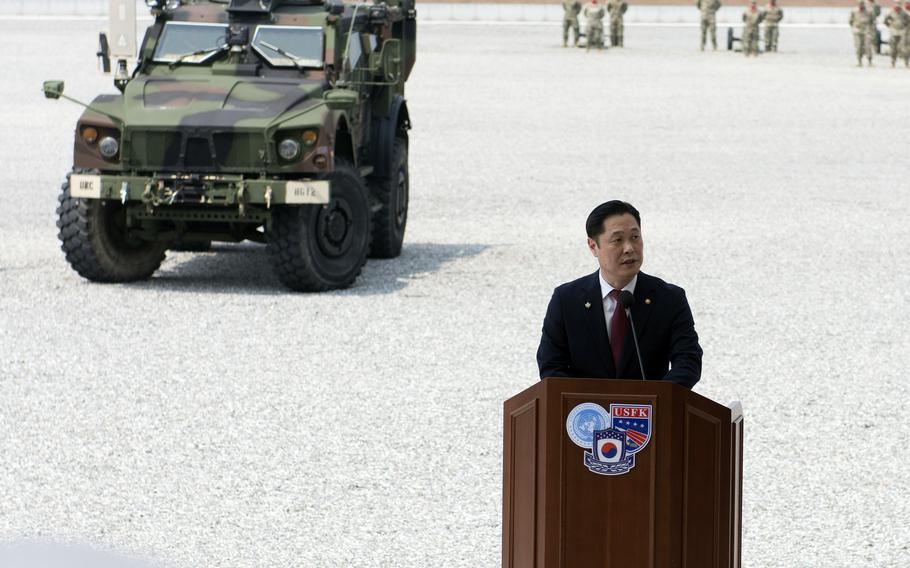
Service members carry member nation flags during a ceremony marking U.N. Command's 75th anniversary at Camp Humphreys, South Korea, July 8, 2025. (Trevares Johnson/Stars and Stripes)
CAMP HUMPHREYS, South Korea — The multinational U.N. Command marked its 75th year of mediating disputes between North and South Korea with the firing of 17 simulated artillery rounds that echoed throughout this Army base on Tuesday.
Roughly 200 service members and South Korean government officials gathered at Barker Field in Camp Humphreys, the largest U.S. military base overseas, to honor the U.N. Command’s charter, instituted shortly after the start of the Korean War.
“The U.N. Command is a testament of international cooperation … to maintain peace and security on the Korean Peninsula,” Canadian Lt. Gen. Derek Macaulay, the deputy commander, said during a speech in front of an honor guard carrying the flags of the 18 member states.
The command’s formation “came at a time of desperation,” Macaulay said, after Soviet-backed North Korean forces invaded the South on June 25, 1950.

U.N. Command's deputy commander, Canadian Lt. Gen. Derek Macaulay, speaks during the command's 75th anniversary ceremony at Camp Humphreys, South Korea, July 8, 2025. (Eric Mendiola/Stars and Stripes)
North Korea’s swift advance prompted the U.N. Security Council to pass a resolution two days later calling for “urgent military measures … to restore international peace and security.”
A day after the resolution passed, North Korean forces captured Seoul.
The Security Council passed another resolution July 7, 1950, recommending member states provide urgent aid to “a unified command under the United States of America” to repel the North’s attack.
Sixteen nations contributed combat troops during the three-year war. The U.S. dispatched nearly 1.8 million personnel, followed by the United Kingdom with approximately 81,000. Six other countries provided medical aid and supplies during and after the conflict.
West Germany established a field hospital in Busan in May 1953, and unified Germany joined the command as its newest member this past August. Denmark deployed the hospital ship MS Jutlandia in September 1950. The vessel, equipped with 356 beds and about 100 medical staff, could receive wounded troops by helicopter within 20 minutes, according to the South Korean Ministry of Foreign Affairs.
An armistice signed July 27, 1953, halted combat between the communist forces and the U.N. Command, although without a final peace treaty the two Koreas remain technically at war.

South Korean Vice Minister of Patriots and Veterans Lee Hee-wan calls U.N. Command a "guardian of peace," during a ceremony marking the command's 75th anniversary at Camp Humphreys, South Korea, June 8, 2025. (Eric Mendiola/Stars and Stripes)
About 187,000 South Korean troops, 37,000 U.S. troops and 3,100 troops from U.N. Command member states died during the conflict. Estimates vary but approximately 100,000 North Korean and Chinese troops and more than 2 million Korean civilians also died.
Today, U.N. Command is responsible for upholding the armistice terms and investigating disputes between North and South. Most recently, South Korea said about 20 North Korean soldiers briefly crossed the Demilitarized Zone on June 9, 2024.
The U.S.-led command “is a testament of international cooperation … to maintain peace and security on the Korean Peninsula,” Macaulay said, echoing his earlier statement.
Current members of the command include: Australia, Belgium, Canada, Colombia, Denmark, France, Germany, Greece, Italy, Netherlands, New Zealand, Norway, Philippines, South Africa, Thailand, Turkey, the United Kingdom and the United States.
South Korean Vice Minister of Patriots and Veterans Lee Hee-wan called the command a “reliable guardian of peace.” A retired navy captain, Lee was shot in both legs during a 2002 battle with North Korean patrol boats in the Yellow Sea.
“Since the armistice, the command has remained steadfast on the Korean Peninsula,” he told those gathered for Tuesday’s ceremony. “It continues to provide powerful deterrence against war and has served as the vital foundation for Korea’s security and prosperity.”